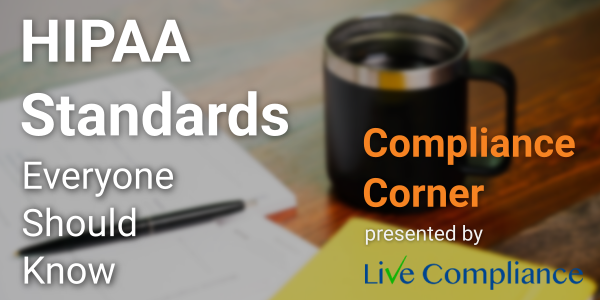
Aug 15, 2022 | Live Compliance, Partner
HIPAA Training Standards Every Business Associate Needs to Know
Per the HIPAA Privacy Rule and HIPAA Security Rule, both Covered Entities and Business Associates, must require HIPAA training for all workforce members that access protected health information (PHI) or electronically protected health information (e-PHI) in any of its forms and should be provided “as necessary and appropriate for the members of the workforce to carry out their functions within the [organization].”
According to the Rule, training must be provided “to each new member of the workforce within a reasonable period of time after the person joins the [organization’s] workforce.” Along with all other annual compliance requirements, HIPAA training is arguably the most important. Your workforce members are your first line of defense in the event of a Breach and must be able to identify your organization’s designated HIPAA Security Officer, and have a firm understanding of the HIPAA Privacy and Security Rule. Training should also highlight the organization’s Technical, Administrative, and Physical Safeguard objective security requirements. It is best practice to provide ongoing security awareness training and, in addition to the mandatory annual training, the Privacy Rule also highlights what’s known as “periodic” training. The goal is to ensure workforce members’ knowledge of HIPAA compliance is not forgotten.
It’s advisable that HIPAA training is given to all employees as new hires during the new employee orientation period, and before new employees are exposed to or work with individually identifiable health information. This includes officers, agents, employees, temporary employees; like students, interns, volunteers, and salespeople. At a minimum, training should cover the basics of HIPAA, the basics of privacy and security requirements and restrictions, and policies and procedures. All new hires need to be provided HIPAA training and a post-test on the material covered within the training course to ensure comprehension of relevant and appropriate HIPAA policies and procedures. Security Officers should be trained on the Breach Notification Rule, Minimum Necessary Rule, and the Organization’s policies and procedures.
The HIPAA Privacy Rule states that “An [organization] must document that the training as described [in the HIPAA Text] has been provided.” Failing to do so will be seen as “willful neglect” and will result in HIPAA violations including monetary penalties as high as $1.5 million dollars. A minor violation may only result in a corrective action plan requirement, whereas a significant data breach attributable to a lack of training will be viewed more seriously.
At Live Compliance, we make checking off your compliance requirements extremely simple.
-
-
- Completely online, our role-based courses make training easy for remote or in-office employees.
- Short informative video training to meet periodic training requirements
- Depending on the size of your organization training may start as low as $79
Call us at (980) 999-1585 or visit us online at www.LiveCompliance.com/ezclaim
ABOUT EZCLAIM:
EZClaim is a leading medical billing, scheduling, and payment software provider that combines a best-in-class product with exceptional service and support. For more information, schedule a consultation today, email our experts, or call at 877.650.0904.

Nov 10, 2020 | Administrative Safeguards, HIPAA, Live Compliance, Medical Billing Software Blog
The noncompliance of HIPAA security rules has had huge consequences for an IT and health information management company.
CHSPSC LLC, (“CHSPSC”) has agreed to pay over $2 million to the Office for Civil Rights (OCR) at the U.S. Department of Health and Human Services (HHS), for the breach of Protected Health Information (PHI). The Business Associate was notified by the Federal Bureau of Investigation (FBI) that it had traced a cyber-hacking group’s advanced persistent threat into CHSPSC’s information system.
After OCR ‘s investigation, it was found that CHSPSC had “longstanding, systemic noncompliance with the HIPAA Security Rule including failure to conduct a risk analysis, and failures to implement information system activity review, security incident procedures, and access controls.” The large health system provided various Business Associate services, including IT and health information management, to hospitals and physician clinics. These violations could have easily been avoided! OCR Director Roger Severino said, “The healthcare industry is a known target for hackers and cyber-thieves. The failure to implement the security protections required by the HIPAA Rules, especially after being notified by the FBI of a potential breach, is inexcusable.”
In addition to the monetary penalty, the Business Associate will be required to complete a “robust” Corrective Action Plan (CAP) with monitoring activity for at least the next two years. CHSPSC will also be required to do the following:
• Implement technical policies and procedures to allow access only to those persons or software programs that have been granted access rights to information systems maintained
• Implement procedures to regularly review records of information system activity, such as audit logs, access reports, and security incident tracking reports
• Conduct accurate and thorough assessments of the potential risks and vulnerabilities to the confidentiality, integrity, and availability of ePHI
All this shows that ANYONE can face HUGE penalties, and they would most likely bankrupt a small billing company or an independent physician practice.
So, based on this specific example, it is VERY important to understand that every complaint or potential breach must be investigated by HHS/OCR. If you, a billing company, or other vendor, suspect a breach, you must inform the covered entity (your client) and have a breach risk assessment completed to determine key factors and take action.
Keep in mind, a Business Associate is a ‘person’ or ‘entity’. This means that ALL billing companies—large or small—need to comply with the Federal HIPAA security rules and regulations. So, if your company has not completed an accurate and thorough security risk assessment, there is a possibility that you could be penalized under ‘willful neglect’. (This category alone gas a fine of $50,000 per violation!)
So then, what can be done to ensure this doesn’t happen to my billing company or my organization? Well, one of EZClaim’s partners, Live Compliance, can make determining your compliance requirements extremely simple:
• Completely online, Life Compliance’s role-based courses make training easy for remote or in-office employees
• Contact-free, accurate Security Risk Assessments are conducted remotely. All devices are thoroughly analyzed regardless of location.
• Policies and procedures are curated to fit your organization, ensuring employees are updated on all workstation use and security safeguards in or out of the office. Update is in real time.
• Electronic, prepared document sending and signing to employees and business associates
So, don’t risk your company’s future, especially when Life Compliance is offering a FREE Organization Assessment to help determine your company’s status. Either call Life Compliance at 980.999.1585, visit LiveCompliance.com to schedule an assessment, or e-mail Jim Johnson.
[ Article contributed by Jim Johnson of Live Compliance ]
———————————-
ABOUT EZCLAIM:
EZClaim is a medical billing and scheduling software company that provides a best-in-class product, with correspondingly exceptional service and support, and can help improve medical billing revenues. To learn more, visit their website, e-mail them at sales@ezclaim.com, or call a representative today at 877.650.0904.



